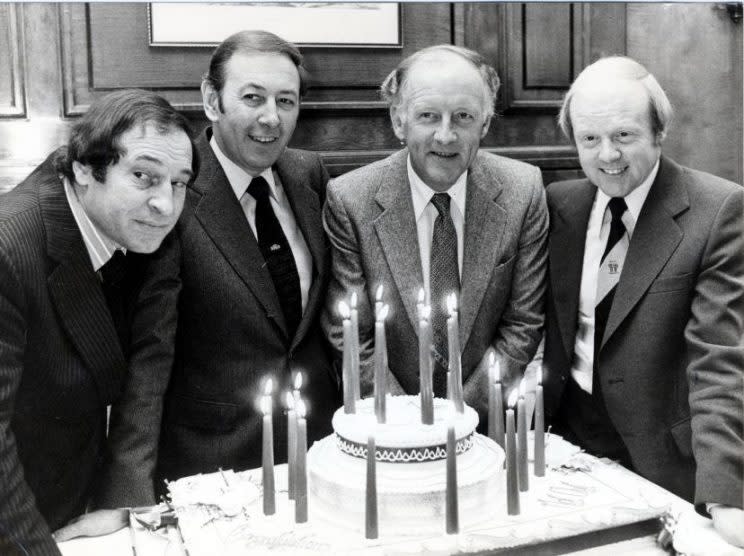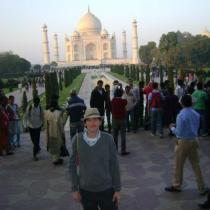Voices of Sport: Tony Gubba - The BBC's Mr Versatile who proved to be one of the very best over four decades
In our weekly series, Yahoo Sport’s Nick Metcalfe features a famous voice of sport. On a big weekend of FA Cup football, BBC presenter and commentator Tony Gubba is the latest to go under the spotlight.

Tony Gubba was another of those wonderful broadcasters who fitted very comfortably into the versatile category.
Plenty of the people featured in this series will always be associated with a single sport, but not Gubba. While many will think of football first and foremost, Gubba always worked on a wide variety of sports and events in a fine career that lasted for decades.
He will be fondly remembered by generations of sports fans as a brilliantly authoritative broadcaster, who had his own natural charm and warmth.
Gubba’s love of sport began at a young age. He was a decent footballer growing up and also enjoyed playing squash. Career wise, his early path will be a familiar one if you’ve been a regular reader of Voices of Sport. He began in the printed press, as a local newspaper reporter in the north west, before he joined the Daily Mirror.
But it was the spoken word that always most interested Gubba, and after spells with Southern TV in Southampton, and the BBC regional news programme Look North, he joined BBC Sport in 1972.
CLICK HERE FOR THE ENTIRE VOICES OF SPORT SERIES
He quickly picked up significant jobs at the corporation. He was given the job of presenting Sportsnight, the BBC’s midweek highlights programme that had been fronted by the legendary David Coleman. He did this full-time for three years, and then on an occasional basis after. He also filled in sometimes for established presenters like Coleman and Frank Bough on Grandstand, the BBC’s flagship weekend sports programme.
But it was as a commentator that we heard Gubba the most. He worked on his first Olympic Games in 1972, and covered matches two years later at the 1974 World Cup finals. He commentated on the football spectacular nine times in succession, all the way through to the 2006 tournament. His working relationship with the Olympics lasted even longer. More of that later.
Match of the Day, the BBC’s famous Saturday night programme, had an established No.1 and No.2 in John Motson and Barry Davies, both of whom I featured in this series last year. But Gubba was a familiar voice on the programme for decades.
In his first full season, he commentated on the 1973 FA Cup semi-final between Leeds and Wolves at Maine Road. Leeds won the match 1-0 thanks to a goal from Billy Bremner, which was expertly described by Gubba.
“It just comes right back at them, awkward bounce. Jones. Here’s Bremner. He must, he has. Sixty nine minutes gone and Billy Bremner, the little dynamo, has broken the deadlock. And you just knew that ultimately that Wolves defence would have to crack. There’s been so much pressure.”
Throughout the 1980s and 1990s, Motson or Davies would tend to have FA Cup finals (most of them for Motson actually) and big matches at international tournaments. But on occasion the key games would fall to Gubba, like the 1986 World Cup semi-final between France and West Germany in Mexico.
The FA Cup has been a staple of the BBC’s football coverage for generations, and in 1992 Gubba was in north Wales to witness a memorable third round upset, when lowly Wrexham beat league champions Arsenal. The Gunners were 1-0 ahead with time running out, when the hosts produced a stunning late turnaround. It gave us the perfect illustration of the qualities of Gubba…
“It’s Thomas who takes it. Oh what a goal, Mickey Thomas. He’s done it, the magic little man at the venerable age of 37 has produced a sensational goal. And that has lit the fires. Oh, could you imagine a free-kick struck sweeter than that and at a more important time?
“Six minutes left. Watkin. Oh he’s scored, Steve Watkin has got a goal. And Arsenal face humiliation. Two goals from Wrexham in the space of two minutes, and suddenly Arsenal’s world is falling around their ears.”
Gubba was given a rare domestic final as commentator, when he was the man behind the microphone for the BBC’s coverage of the 2007 League Cup final in Cardiff, when Chelsea beat London rivals Arsenal.

However, as I mentioned at the start of this feature, football was far from the be all and end all for Gubba. The list of sports he covered over the years is an exhaustive one. Among them was hockey, table tennis and golf. Then there was tennis, cycling, rowing and speed skating. I could go on, but I think you get the idea. You name it, he covered it.
Every January, millions of viewers would make it an annual ritual to follow the World Darts Championship from Surrey’s Lakeside. The likes of Eric Bristow, Jocky Wilson and John Lowe had become household names and were synonymous with the annual event. For some years, Gubba was a familiar part of the show too.
He was there from beginning to end, whether it was presenting the evening highlights programmes or the live coverage at the weekends, including the final. It was also a tradition for him to speak with the winner of the tournament shortly after the climax. Like so many others, I used to love the World Championship growing up, seeing it as a real new year treat, and Gubba was the ideal companion.
Whatever his job, Gubba’s style never really changed over all the years. Firstly, he was distinctive. In this age of many presenters and commentators sounding quite similar, I think it’s genuinely interesting to note that. When you tuned in for a match when Gubba was on duty, you knew in an instant he was your companion.
He always had a great knowledge of events, and a real authority. He also had that unmistakable warmth – a feeling of “come in closer, and enjoy the action”. And when the big moments arrived, he would rise to the occasion with trademark excellence.
He really was just the consummate professional. The BBC always knew that when they called on Gubba, they would receive the most reliable of services. Thinking about it, he was essentially unflappable. Whatever the event, however breathless the drama, viewers always knew that Gubba was in total charge of his brief.
Alongside the presenting and commentating, he had all the vital attributes of an old-fashioned reporter, and was tenacious in his interviewing style. He certainly never shied away from asking awkward questions of the stars.
In fact, Gubba once had a minor falling out with ice skating superstars Jayne Torvill and Christopher Dean. The year before the British pair famously won Olympic gold with their Bolero routine, Gubba questioned whether their innovative style had broken any rules after they had claimed the World Championship title in Helsinki.
Gubba generally wound down his activities as he entered his sixties, although he did commentate on all eight series of the ITV entertainment programme, Dancing on Ice.
His final big sporting event, fittingly, was the London Olympics in 2012. He worked at the Games for Olympic Broadcasting Services, which sends broadcasts across the world. It meant he had covered every Olympics for 40 years, from 1972 in Munich through to London. By anyone’s standards, that really is quite a run.
Sadly Gubba died soon after, in March 2013, following a short battle with leukaemia. He was 69. We had lost one of our most famous broadcasters, a man that had been greatly respected by viewers across the country.
During his tribute, BBC colleague Davies said: “Jimmy Hill once said that he judged commentators by whether they irritated him or not. It was clear that not many were irritated by Tony.”
Another BBC man, Gerald Sinstadt, summed up Gubba’s career in what I think is very apt fashion: “Darts or dogs, full-backs or bobsleighs, skaters or skiers, he tackled them all, authority underpinning enthusiasm.”
Good old Tony. We’ll always smile when we hear that voice won’t we? It will remind us of times long gone in our lives. A reliable constant in the corner of our living rooms. The world of broadcasting is full of people we almost came to see as old friends. Gubba is very much one of them.


